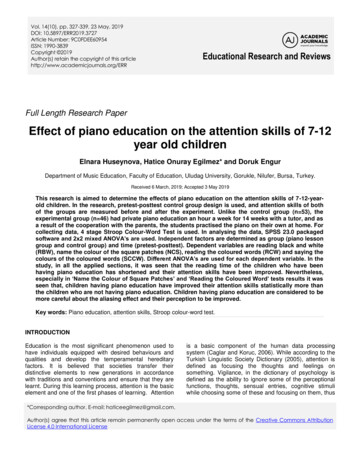
Transcription
Vol. 14(10), pp. 327-339, 23 May, 2019DOI: 10.5897/ERR2019.3727Article Number: 9C0FDEE60954ISSN: 1990-3839Copyright 2019Author(s) retain the copyright of this nal Research and ReviewsFull Length Research PaperEffect of piano education on the attention skills of 7-12year old childrenElnara Huseynova, Hatice Onuray Egilmez* and Doruk EngurDepartment of Music Education, Faculty of Education, Uludag University, Gorukle, Nilufer, Bursa, Turkey.Received 6 March, 2019; Accepted 3 May 2019This research is aimed to determine the effects of piano education on the attention skills of 7-12-yearold children. In the research, pretest-posttest control group design is used, and attention skills of bothof the groups are measured before and after the experiment. Unlike the control group (n 53), theexperimental group (n 46) had private piano education an hour a week for 14 weeks with a tutor, and asa result of the cooperation with the parents, the students practised the piano on their own at home. Forcollecting data, 4 stage Stroop Colour-Word Test is used. In analysing the data, SPSS 23.0 packagedsoftware and 2x2 mixed ANOVA’s are used. Independent factors are determined as group (piano lessongroup and control group) and time (pretest-posttest). Dependent variables are reading black and white(RBW), name the colour of the square patches (NCS), reading the coloured words (RCW) and saying thecolours of the coloured words (SCCW). Different ANOVA’s are used for each dependent variable. In thestudy, in all the applied sections, it was seen that the reading time of the children who have beenhaving piano education has shortened and their attention skills have been improved. Nevertheless,especially in ‘Name the Colour of Square Patches’ and ‘Reading the Coloured Word’ tests results it wasseen that, children having piano education have improved their attention skills statistically more thanthe children who are not having piano education. Children having piano education are considered to bemore careful about the aliasing effect and their perception to be improved.Key words: Piano education, attention skills, Stroop colour-word test.INTRODUCTIONEducation is the most significant phenomenon used tohave individuals equipped with desired behaviours andqualities and develop the temperamental hereditaryfactors. It is believed that societies transfer theirdistinctive elements to new generations in accordancewith traditions and conventions and ensure that they arelearnt. During this learning process, attention is the basicelement and one of the first phases of learning. Attentionis a basic component of the human data processingsystem (Caglar and Koruc, 2006). While according to theTurkish Linguistic Society Dictionary (2005), attention isdefined as focusing the thoughts and feelings onsomething. Vigilance, in the dictionary of psychology isdefined as the ability to ignore some of the perceptionalfunctions, thoughts, sensual entries, cognitive stimuliwhile choosing some of these and focusing on them, thus*Corresponding author. E-mail: haticeegilmez@gmail.com.Author(s) agree that this article remain permanently open access under the terms of the Creative Commons AttributionLicense 4.0 International License
328Educ. Res. Rev.to perceive chosen stimulants more clearly and tocontrol and direct all of these processes voluntarily(Budak, 2000), attention and perception are necessary inorder to notice stimuli received by sense organs duringsensual registry and transfer them to short term memory(Kurtuldu, 2012). According to Anderson (2002), attentioncontrol arises in babyhood and develops rapidly in earlychildhood. However, cognitive flexibility, targeting anddata processing develop at the age of 7-9 and fullydevelop at the age of 12. According to Piaget (as cited inUlugbay (2013)) the intelligence development of childrenis accelerated especially between 2-7 years and 7-12years of age. This situation took effect in choosing 7-12year-old children for the sample and the belief that musiceducation might have a significant position in thedevelopment of children’s attention level, and skills weredeterminant in deciding the subject.This is because music education allows development ofchildren's skills such as analysis, synthesis, coordinationto develop, and tends towards creativity by developing adeliberate thought. Today, music education expertsemphasise that musical instrument training, which is animportant aspect of music education, is of capitalimportance for the personality development, developmentof emotions and skills in children and their learning to beself-confident, patient and self-disciplined along withhaving sustainable attention skills. Also, according toHallam (2015), active engagement with music has asignificant impact on brain structure and function. Hallam(2015) suggests that correlation studies prove that thereare relationships between musical activities and thevarious skills related to literacy including verbal andauditory working memory, spatial reasoning andmathematical performance, intellectual development,creativity, emotional intelligence etc. Early pianoeducation gained importance after 1950’s. There werenot a consensus between musicians and childdevelopment experts on the correct time to start pianoeducation and the schedule that should be followed,since musicians did not master on child development andchild development experts did not master on musiceducation; and these were interdependent. However, bytime it is understood that the earlier the child starts musiceducation the better the result is, and philosophy of musiceducation is formed. As a result of this the effect ofplaying piano on the development of child started to beinvestigated (Minina, 2012).While playing the piano, which is an instrument playedwidely in Turkey, melodies with several rhythms written intwo staves in different clefs (treble clef – bass clef) haveto be performed correctly and precisely. Performing thesecomplicated tasks requires a perfect eye, hand and footcooperation. Besides these psychomotor skills, manyactivities such as polyphonic hearing can be donetogether while playing the piano. Given complex activitiesare known to benefit the development of data processingin children’s brains. Playing the piano is also believed torequire continuous attention and focusing.In a study of Shaw and Rauscher (as cited in Ulugbay(2013)), it is argued that the most functional way toimprove cognitive structure that affects preschoolchildren’s demonstrating high skills in mathematics andscience is playing piano; and that music education,particularly piano education until the age of 12 is anactivity requiring functions which mathematics and chessentail, such as high brain functions.Studies of Pavlov (2008) are focused on theimportance of instrument education. In one of hisresearches, there were 41 children who played aninstrument (n 14 playing flute, n 27 playing piano) and25 children who did not play any instrument. All childrenwere between the ages of 6 and 7, their characteristicsand cognitive abilities were equal. After 7-8 months ofeducation, all of the children had 6 differentneuropsychological tests measuring their attention skillsand cognitive abilities. Children who played an instrumentwere shown to have higher improvement than thechildren who did not play. Children who played flute hadhigher perception of space when compared to the others.Children who played piano had higher acceleration aswell as improvement in verbal reasoning, verbal memory,logical intelligence, cognitive and psychomotor skills.Permiakova and Tkachenko (2016) conducted a study onchildren who recently have started to play piano and hadsimilar results. Their study, which was made inEkaterinburg consisted of 50 children; 26 of them did notplay any instrument, while 24 of them have started totake piano lessons. After a period of one year, thesechildren had required tests at the NeuropsychologyLaboratory of Moscow State University. The children whoplayed piano were shown to have higher improvements incognitive and psychological skills; and 1.5 times higheracceleration especially in motor development. In thesecond part of this study, Permiakova and Tkachenko(2016) made a second experiment on 10 male childrenwho have hyperactivity and attention deficit disorder. 5 ofthem played piano and 5 of them did not play anyinstrument. Both of the groups had similar tests as theprevious groups, such as attention, memory andcognitive ability. After a period of one year, childrenplaying piano had significantly better results than thechildren who did not play piano. Piano education isrecommended especially for children diagnosed withhyperactivity and attention deficit disorder.The studies mentioned above show the benefits ofmusic and piano education for brain development. One ofother rare studies showing the benefits of pianoeducation for attention skills is Demirova’s (2008)research. Demirova (2008) presented in her study thatpiano education affects the attention skills of elementaryschool children positively. Also, Kuscu (2010) stated thatthe attention skills of preschool children improvesignificantly because of musical activities including OrffSchulwerk approach. In accordance with the international
Huseynova et al.and national studies mentioned above, it can be statedthat studies show the significant effect of musiceducation, particularly piano education on children’sdevelopment.Attentive study and long-term concentration are twoimportant factors of playing piano, which is among theinstruments that are suitable to begin at an early age.Attention has the same importance in every school,education system and curriculum. In this context, therelationship between playing the piano and attention thatis defined as a bridge or a tool between the students’musical improvement and their performing this on thepiano by Demirova (2008) is detected.PROBLEM SITUATIONDuring the education of a child, school success is one ofthe most concerned issues by the parents and teachers.There are many factors playing a role in school success,and a child not being able to focus on a subject plays anegative role in his/her school life as well. This problemoccurs when the child starts elementary school, andhe/she is expected to focus on a subject. However,focusing on a subject can be taught by an educationstarting at an early age (Ozdogan, 2001). Attention, as itis seen, is an ability that can be improved. Theresearchers stated that in order for children to be able toconcentrate and to improve their attention span, musiceducation could be an effective tool. However, pianoeducation having effect on children’s attention skills hasnot been a subject except for a few research.Accordingly, the problem sentence of this research hasbeen determined as: Is piano education effective on theattention skills of 7-12-year-old children? Researchquestions have been considered to provide anopportunity to solve the problem of the research.Research questions1. Is there a significant interaction effect between group(experimental and control) and test (pretest and posttest)factors on reading black and white (RBW)?2. Is there a significant interaction effect between groupand test factors on naming the colour of square patches(NCS)?3. Is there a significant interaction effect between groupand test factors on reading the coloured words (RCW)?4. Is there a significant interaction effect between groupand test (pretest and posttest) factors on saying thecolours of the coloured words (SCCW)?5. Is there a significant interaction effect between groupand test factors on time difference between SCCW andRCW?6. Is there a significant interaction effect between groupand test factors on wrong answers?3297. Is there a significant interaction effect between groupand test factors on spontaneous recovery numbers?Research objectiveIn this research, the aim is to determine the effects ofpiano education on the attention skills of 7-12-year-oldchildren.ImportanceThis research is considered important for the followingreasons;1. Being one of the first studies on determining the effectsof piano education on the attention skills of children.2. By stating the effect of piano education on the attentionskills of 7-12-year-old children.3. By being beneficial and being a resource for theinstitutions giving piano education, teachers and studentsand the researches on this subject.AssumptionsIn this research it is assumed that;1. Children have responded to the instructions sincerely,caringly and carefully during the Stroop Test applications;2. Stroop test is an effective tool for measuring attention.LimitationsResearch is limited by:1. 46 students taking piano education and 53 studentswho do not take piano education at the age of 7-12 inBursa province.2. An application period of fourteen weeks on pianoeducation.3. Stroop Colour-Word Test which is used in order todetermine the attention skills of students and personalinformation form.4. Statistical analyses on Stroop Colour-Word Test.METHODSIn this chapter, model, population and sample of the research; datacollection tools used in the research; and collection and analyses ofdata are studied.Model of the researchThis study is conducted using a mixed factorial design. According toFraenkel et al. (2012), factorial designs are experimental designs
330Educ. Res. Rev.Table 1. Age Distribution of experimental and control 510,9919,63473,9Experimental 10651246%21,76,521,713,010,926,1100that involve two or more independent variables, at least one ofwhich are manipulated. Field (2013) classifies the factorial designsaccording to whether the independent variables are measuredusing different or the same entities. If the independent variables aremeasured using different entities the design is called independentfactorial d
Effect of piano education on the attention skills of 7-12 year old children Elnara Huseynova, Hatice Onuray Egilmez* and Doruk Engur Department of Music Education, Faculty of Education, Uludag University, Gorukle, Nilufer, Bursa, Turkey. Received 6 March, 2019; Accepted 3 May 2019 This research is aimed to determine the effects of piano education on the attention skills of 7-12-year-old .
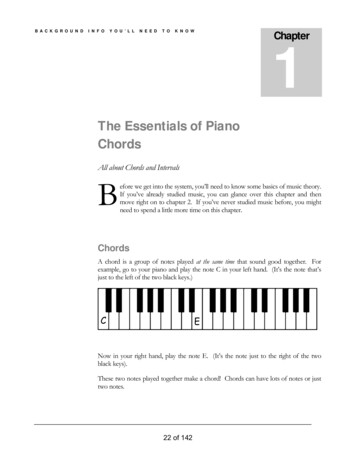
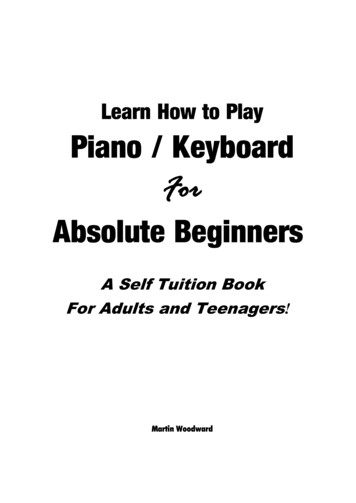

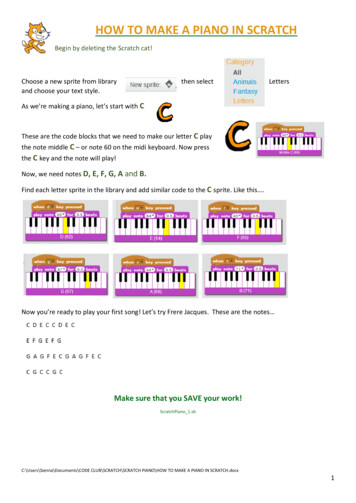
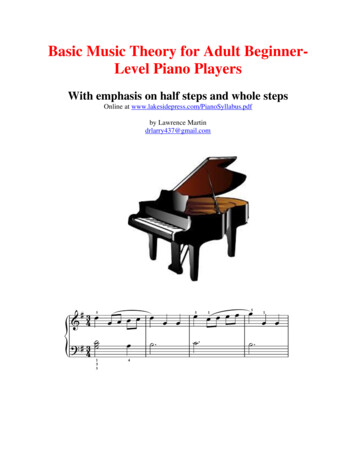
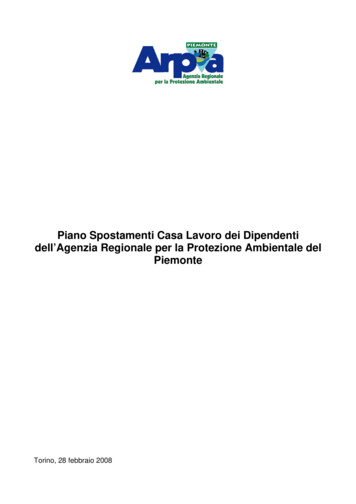
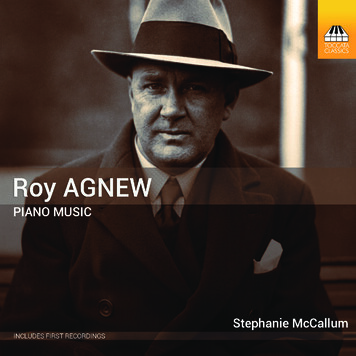
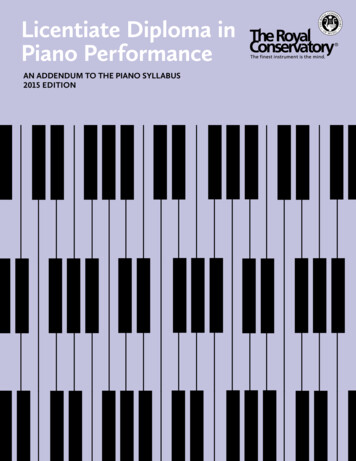
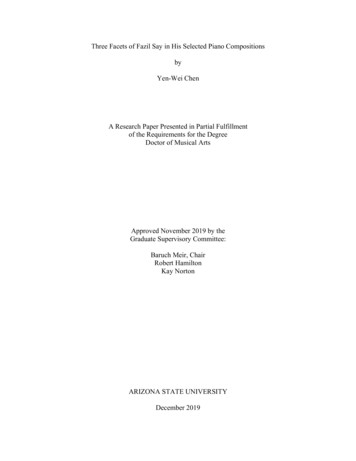
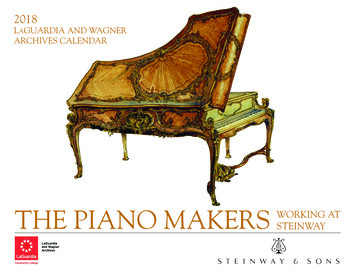
![Roman Statkowski [1859-1925] Piano Music](/img/3/25129booklet.jpg)
